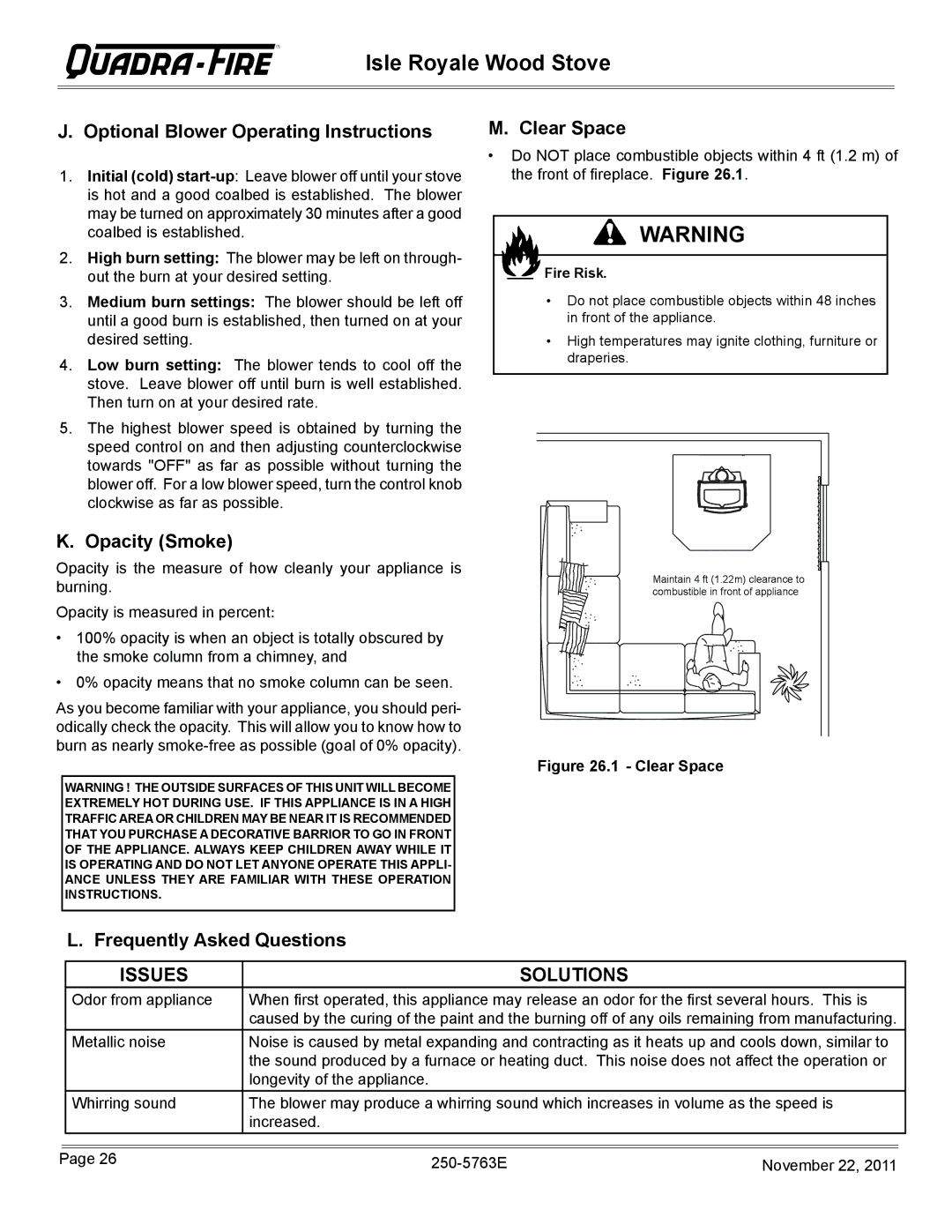
R
Isle Royale Wood Stove
J. Optional Blower Operating Instructions
1.Initial (cold)
2.High burn setting: The blower may be left on through- out the burn at your desired setting.
3.Medium burn settings: The blower should be left off until a good burn is established, then turned on at your desired setting.
4.Low burn setting: The blower tends to cool off the stove. Leave blower off until burn is well established. Then turn on at your desired rate.
5.The highest blower speed is obtained by turning the speed control on and then adjusting counterclockwise towards "OFF" as far as possible without turning the blower off. For a low blower speed, turn the control knob clockwise as far as possible.
K. Opacity (Smoke)
Opacity is the measure of how cleanly your appliance is burning.
Opacity is measured in percent:
•100% opacity is when an object is totally obscured by the smoke column from a chimney, and
•0% opacity means that no smoke column can be seen.
As you become familiar with your appliance, you should peri- odically check the opacity. This will allow you to know how to burn as nearly
WARNING ! THE OUTSIDE SURFACES OF THIS UNIT WILL BECOME EXTREMELY HOT DURING USE. IF THIS APPLIANCE IS IN A HIGH TRAFFIC AREA OR CHILDREN MAY BE NEAR IT IS RECOMMENDED THAT YOU PURCHASE A DECORATIVE BARRIOR TO GO IN FRONT OF THE APPLIANCE. ALWAYS KEEP CHILDREN AWAY WHILE IT IS OPERATING AND DO NOT LET ANYONE OPERATE THIS APPLI- ANCE UNLESS THEY ARE FAMILIAR WITH THESE OPERATION INSTRUCTIONS.
M.Clear Space
•Do NOT place combustible objects within 4 ft (1.2 m) of the front of fi replace. Figure 26.1.
WARNING
Fire Risk.
•Do not place combustible objects within 48 inches in front of the appliance.
•High temperatures may ignite clothing, furniture or draperies.
Maintain 4 ft (1.22m) clearance to combustible in front of appliance
Figure 26.1 - Clear Space
L. Frequently Asked Questions
|
| ISSUES |
| SOLUTIONS |
|
|
| Odor from appliance | When fi rst operated, this appliance may release an odor for the fi rst several hours. This is |
| |
|
|
| caused by the curing of the paint and the burning off of any oils remaining from manufacturing. |
| |
|
|
|
|
| |
|
| Metallic noise | Noise is caused by metal expanding and contracting as it heats up and cools down, similar to |
| |
|
|
| the sound produced by a furnace or heating duct. This noise does not affect the operation or |
| |
|
|
| longevity of the appliance. |
|
|
|
|
|
|
| |
|
| Whirring sound | The blower may produce a whirring sound which increases in volume as the speed is |
| |
|
|
| increased. |
|
|
|
|
|
|
| |
|
|
|
|
|
|
|
|
|
|
|
|
Page 26 | November 22, 2011 |
| |||
|
|
|
| ||
